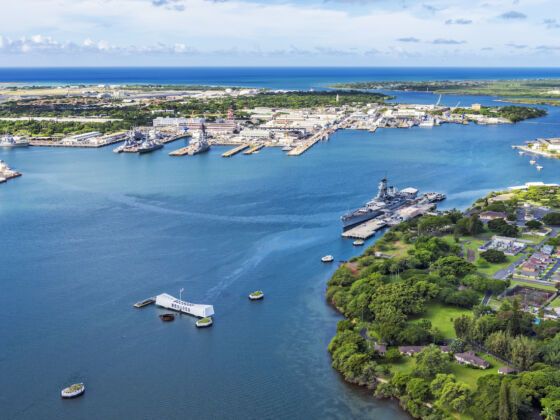I LIVE IN JAPAN with my husband, who is a member of the US Navy, and I love it. Before we received our orders here, living in Japan, or critical thinking about the relationship between the US and Japan, was not on my radar at all. As we prepared to move here, I thought, “Why on Earth does the US have so many people stationed over there?” and later, “Why on Earth would Japan, a country where we, in recent history, dropped a nuclear bomb, let us?” and on the plane over here, “Why are they letting me move to Japan without understanding any of that?”


Here are the basics, some of which I knew, some that I have learned: 71 years ago, Japanese fighter planes attacked the US fleet in Hawaii, killing over 2,000 troops and injuring another 1,000. The next day, President Roosevelt delivered his famous speech where he describes December 7th, 1941, to be “a date which will live in infamy,” and Congress declared war on Japan.
In August 1945, the US dropped nuclear bombs on Hiroshima and Nagasaki, killing hundreds of thousands of people. The Japanese surrendered in September and the US remained in Japan as part of an occupying force until 1952. After the occupation, new treaties between the US and Japan were drawn, and today 38,000 US service members (that doesn’t include civilian DOD employees or their families) are stationed in Japan to aid in defense and serve as a base for US-Pacific relations.
Tomorrow is the anniversary of the attack on Pearl Harbor. Japanese people don’t “celebrate” the date any more than Americans celebrate the dates that the US attacked Hiroshima or Nagasaki. But the date is making me think about me, an American, living in Japan as part of the SOFA (Status of Armed Forces Agreement) between the US and Japan. How much should I know? Everything, right? Isn’t it my responsibility to not be a dum-dum and understand why I’m allowed to be living here and how people feel about it?
Yes, but I don’t.
Anecdotally, I have heard that older generations of Japanese people still very much hold the aftermath of World War II against Americans that they encounter today. I have never experienced this. Anecdotally, I have heard that parts of Japan are so unwelcoming to Americans, that I wouldn’t be allowed in a bar or restaurant. I have never experienced this. I have older Japanese neighbors who say nice things and smile at me a lot. I have spent lots of money in Japanese bars and restaurants and never felt unwelcome.
Recently, US Forces Japan instated a curfew for active duty service members based in or visiting Japan. (I don’t know the specifics because I’m in bed by 10pm every night anyway.) The curfew is a response to the very bad behavior of a few US military members, at a time when there is anti-US sentiment in parts of Japan, especially Okinawa, where most troops are stationed.
I had lunch with a few Japanese ladies and American ladies (everyone present was married to US service members) recently, and the curfew came up. One of the American women said, “What do Japanese people think of the curfew?”
A Japanese woman said, “The Japanese people I know love to complain about the military but they also love to shop on base if they get the chance.”
I don’t speak Japanese well enough to have a real conversation with anyone, and I certainly don’t read Japanese well enough to get news from a newspaper, so I rely on Japanese women I know and stories I hear from Americans who have been in Japan longer than me. But I know that is the lazy way.
I told my family this week that living abroad as a dependent with the military feels like living abroad with training wheels. I volunteer in an office of English-speaking people, I can get Doritos any time I want, there are American doctors, dentists, and lawyers available to me if I need them. Because of this, I learned less about Japan before I got here than I should have. And because of this, on an anniversary of so much violence, I am deciding now I need to know more. This post was originally published on December 6, 2012.